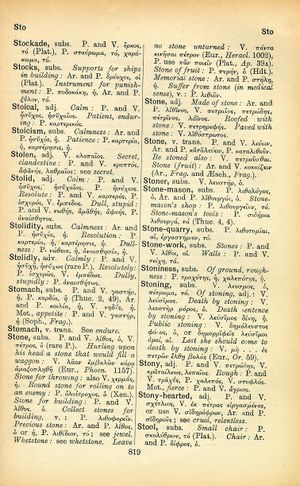stone
ἐν μὲν γὰρ εἰρήνῃ καὶ ἀγαθοῖς πράγμασιν αἵ τε πόλεις καὶ οἱ ἰδιῶται ἀμείνους τὰς γνώμας ἔχουσι διὰ τὸ μὴ ἐς ἀκουσίους ἀνάγκας πίπτειν → in peace and prosperity states and individuals have better sentiments, because they do not find themselves suddenly confronted with imperious necessities
English > Greek (Woodhouse)
subs.
P. and V. λίθος, ὁ, V. πέτρος, ὁ (rare P.).
Hurling upon his head a stone that would fill a waggon: V. λᾶαν ἐμβαλὼν κάρᾳ ἁμαξοπληθῆ (Eur., Phoen. 1157).
Stone for throwing: also V. χερμάς, ἡ;
Round stone for rolling on to an enemy: P. ὀλοίτροχος, ὁ (Xen.).
Stone for building: P. and V. λίθος, ὁ.
Collect stones for building, v.: P. λιθοφορεῖν.
Precious stone: Ar. and P. λίθος, ὁ or ἡ, P. λιθίδιον, τό; see jewel.
Whetstone: see whetstone.
Leave no stone unturned: V. πάντα κινῆσαι πέτρον (Eur., Heracl. 1002), P. use πᾶν ποιεῖν (Plat., Ap. 39A).
Stone of fruit: P. πυρήν, ὁ (Hdt.).
Memorial stone: Ar. and P. στήλη, ἡ.
Suffer from stone (in medical sense), v.: P. λιθιᾶν.
adj.
Made of stone: Ar. and P. λίθινος, V. πετραῖος, πετρώδης, πέτρινος, λάινος.
Roofed with stone: V. πετρηρεφής.
Paved with stone: V. λιθόστρωτος.
v. trans.
P. and V. λεύειν, Ar. and P. καταλεύειν, P. καταλιθοῦν.
Be stoned also: V. πετροῦσθαι.
Stone (fruit): Ar. and V. κοκκίζειν (Ar., Frag. and Aesch., Frag.).

